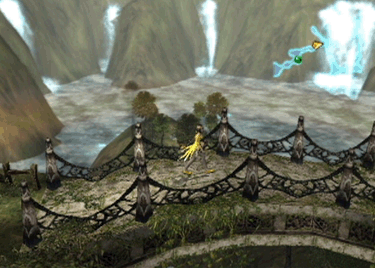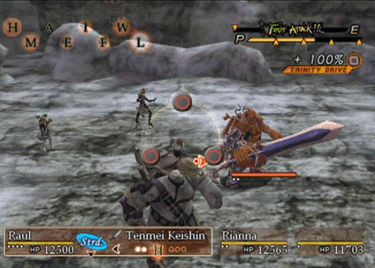I am, as ever, a sucker for a good, epic adventure RPG. Final Fantasy, Star Ocean, Legend of Zelda, Tales of Symphonia, Kingdom Hearts, Xenosaga—the list goes on and on. So when the buzz surrounding ATLUS’ Magna Carta: Tears of Blood trickled down to my ears, money and trade credit were quickly brought to bear.
Magna Carta: Tears of Blood centers around the story of Calintz, a rather effeminate swordsman who leads the mercenary band known as the Tears of Blood. Calintz and his ragtag bunch of angsty warriors-for-hire work for the Alliance (AKA the good human guys) against the Yason (AKA the bad non-human guys). At first glance, it’s kind of hard to tell the Yason from the humans, except that Yason women are apparently into the pasty look and are hotter and sluttier, while Yason men are all angsty and annoying little weenies. Have I mentioned they all have kind of strangely deformed ears?
As the game starts, the humans are fixing to unleash a world of ass-kicking on the Yason by means of something ambiguously called “the ultimate magic.” The Yason queen, who wears a very Phantom-of-the-Opera-esque mask, parries it with ease (because it’d be a damn short game otherwise), and the war continues. Tears of Blood—represent.
If you’ve played any game like this, you already have an idea of what to expect—a fairly linear adventure in which the hero slowly builds up a band of comrades to struggle against the big bad. Calintz’s comrades consist of the whole array of adventure RPG stereotypes: the quiet and angry brute, the powerful and sexy female mage, the snarky and self-absorbed male shooter, the hero-worshipping kid and the beautiful and innocent romantic interest. If you can name the characters fitting those roles in other adventure games, pat yourself on the back.
Continuing with the ingredients of the epic adventure RPGs, Calintz and company fight myriad battles, improve their skills and equipment, solve little puzzles and hopefully save all civilization while hopefully hooking Calintz up with the girl. Magna Carta does not stray one teaspoon from the recipe.
Gameplay in Magna Carta isn’t necessarily intuitive, and ATLUS offers only the most rudimentary tutorial. The battle system is kind of a strange marriage of the Active Time system found in numerous Final Fantasy games and a more action-oriented tactical simulator in which positioning your side is important. Actually attacking an opponent is a kind of Dance Dance Revolution for the thumbs, as each attack requires pressing the O and/or X buttons at exact intervals. Hit it dead on and you’re rewarded with a little extra punch; miss it and the whole attack fails. This takes some getting used to but becomes second nature after a few hours. On the surface it really seems to lack any element of strategy, which begins to set off the button-masher alarm, and we hates the nasty button-mashers, precious. We hates them.
Enter the concept of “chi.” Chi represents the different forces found in the environment around our heroes that power their attacks and spells. Your mage can’t blast your unfortunate foes with a fireball in an area with no Fire Chi, and Calintz’s first sword-fighting style is just useless without some Wind Chi going on. As you progress, characters learn new magic and fighting styles, requiring the player to restructure the party frequently, as well as switch between styles on the fly as chi becomes unavailable or is used up. While the whole Chi bit is annoying when it’s working against you, it does force the player to plan ahead and employ some basic resource-management strategy.
The battle system relies heavily on an unusual device ATLUS describes ambiguously as “leadership,” which could have been much more clearly termed “morale.” Your comrades-in-arms fight more effectively when they actually like Calintz and have faith in his leadership. If they think he’s a girly-looking white-haired chump, they’re just about useless. By the same token, if the Tears of Blood are lined up against a horde of bloodthirsty monsters of ultimate doom, your peeps fight less effectively than if, say, Calintz and the lads are throwing down with a crippled housecat.
As expected, Magna Carta has a good, although perhaps somewhat cliché, story. While it stems from the very basic and humdrum humans vs Yason conflict, it grows into a larger political story with different factions in both the human and Yason worlds. Back stories are developed wonderfully through multiple flashbacks, and many of the big curveballs in the story are both surprising and rewarding.
Visually, it’s a gorgeous game. Although many of the male characters in the game look like—well—women, the backgrounds, characters, monsters and most of the cutscenes are all very nicely rendered. However, some of these cutscenes aren’t really FMV at all, but a still graphic with text appearing on the screen representing conversation between characters—so, so lame. Where the game really falls off is sound. While the score is excellent, the in-game sounds get repetitive fast and the voice acting is spotty at best. With a few exceptions, most of the major characters come off as either emotionless and flat or way over the top.
Another major, intergalactic-sized flaw in the game is the load times, which are both long and frequent. It’s the nature of the beast that occasionally a few seconds are needed to load up the next area from time-to-time, but Magna Carta will take upwards of 20 seconds for each load and it goes to the well every time Calintz and his trusty band travel between areas. Combine this with a wonky camera system that often makes perceiving exactly which direction you’re moving problematic, and it blends into an extremely frustrating little cocktail.
The benchmark for any game of this nature is the Final Fantasy series, and I’m sad to say Magna Carta—Tears of Blood falls short. While it’s an enjoyable game, it’s nowhere near the epic adventure experiences provided by Square Enix. It has little to no replay value, and the 40-50 hours spent in game are all this title will deliver to anyone except the truly die hard. Fans of the genre will enjoy it and should give it a try. Everyone else: consider a rent, but your gaming dollars will be better spent elsewhere.


